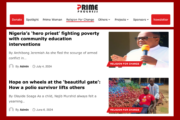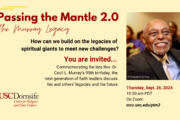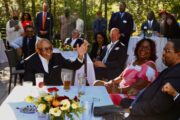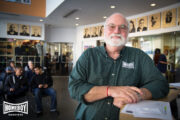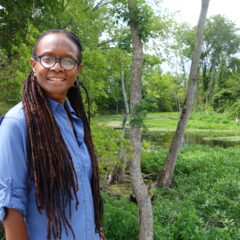The following interview guide may be useful to journalists and researchers interested in collecting and telling stories of humanitarianism and/or the role of spirituality in people’s lives and work.
The USC Center for Religion and Civic Culture created this interview guide as a tool for researchers and journalists to use in “Spiritual Exemplars: A Global Project on Engaged Spirituality.” It was adapted from Northwestern University’s Study of Lives Research Group to interview exemplary humanitarians and learn more about how their religious values and spiritual practices inspire and sustain their work on social challenges.
Learn more about the project and read profiles
You are welcome to use or adapt this tool, and we would love to hear about your experience with it: crcc@usc.edu.
Interview Guide
Loose style guide:
- Highly individualized script to each case study: custom made questions based on previous public profiles and interviews
- Create conversational tone. Say something about yourself and your personal experiences. Get them to tell a story, about something in their experience, instead of abstract reflection
- Include research and larger findings in interview script
- Preface to each questions, pose some of the complexity that an answer might have
- Probes
Introduction
This is an interview about the story of your life. As a journalist/social scientist, I am interested in hearing your story, including parts of the past as you remember them and the future as you imagine it. The story is selective; it does not include everything that has ever happened to you. Instead, I will ask you to focus on a few key things in your life – a few key scenes, characters, and ideas. There are no right or wrong answers to my questions. Instead, your task is simply to tell me about some of the most important things that have happened in your life, illustrated with examples from your work. I will guide you through the interview which should take about two hours, although I am happy to continue the interview at another time if we don’t finish in this session.
The main goal of the interview is simply to hear your story. As a journalist/social scientist, my colleagues and I are interested in understanding what motivates people like yourself. We are interviewing 100 people in order to understand the different ways in which religion and spirituality function for people involved in humanitarian work. Everything you say is voluntary. Please stop me if my questions are too personal. I would like to record the interview, but I can turn it off at any point and you can indicate if some parts of the interview are confidential.
Do I have permission to record the interview?
Do you have any questions?
Life Chapters
Please begin by thinking about your life and the evolution of who you are and the work you do today, as if it were a book or novel. Imagine that the book has a table of contents containing the titles of the main chapters in the story. To begin here, please describe briefly what the main chapters in the book might be. Please give each chapter a title, tell me just a little bit about what each chapter is about.
[Interviewer may consider providing a very brief example using their own life to illustrate or create comfort]
As a storyteller here, what you want to do is to give me an overall plot summary of your story, going chapter by chapter. You may have as many chapters as you want, but I would suggest having between about two and seven of them.
Interviewer: Jot Chapter Outline Here
Now that you have described the overall plot outline for your life, I want us to think about the work you’ve done and built over time and the work you continue to do as it evolves in the future. I would like you to focus on key moments, lessons, triggers, set-backs or catapults in your life or work. I may ask that you describe what happened, when and where it happened, who was involved, and what you were thinking and feeling in the event. In addition, I ask that you tell me why you think this particular “scene” is important or significant in your life.
Positive Childhood Memory
Let’s begin with an early memory – from childhood or your teen-aged years – that stands out as especially positive in some way. This would be a very positive, happy memory from your early years. Please describe this good memory in detail. What happened, where and when, who was involved, and what were you thinking and feeling? How has this positive memory translated into the person you are today?
Probes:
Was there a trigger, a particular mentor, a particular experience that catapulted you into your work?
Aside from the people we just discussed, what else influenced the way you thought? Did you have a strong family subculture? A faith tradition? Your cultural context? A school?
Who were you in adolescence? Can you see a continuity from who you were then and the work you’ve gone on to do?
Did you experience any significant turning points or pivotal moments in that period of life before you began this work?
Negative Childhood Memory
Much of the research into historic spiritual exemplars, such as Mother Teresa or Gandhi, points to experiences of childhood adversity or life trauma that weighed as a heavy influence in their life and work.
Is there an early memory – from childhood or your teen-aged years – that stands out as especially negative in some way. This would be a very negative, unhappy memory from your early years, perhaps entailing sadness, fear, or some other very negative emotional experience. If something is too personal or might be upsetting to you, there is no need to share it with me.
Probe:
How did this impact the person you are today and the work that you do?
Did you feel you lived a life of struggle or one of privilege?
High Point
Please describe a scene, episode, or moment in your life that stands out as an especially positive experience. This might be the high point scene of your entire life, or else an especially happy, joyous, exciting, or wonderful moment in the story. Please describe this high point scene in detail. What happened, when and where, who was involved, and what were you thinking and feeling? Also, please say a word or two about why you think this particular moment was so good and what the scene may say about who you are as a person.
Probes:
Is there someone you admire?
Is there a particular person or set of people who sustain you? Nourish your soul? Your go-tos, your people?
Let’s talk about inspiration and motivation — not from daily practice — but from the work itself. Many people think that sustenance must come from an external source, but it seems like it could come from the work and the people you interact with daily? Talk about that.
In this project/work, what are you proudest of? If you could sum it up, what would you say you do here as an organization? I don’t mean the actual programs, but under that, who are you, what happens here, what do people gain here? And what would you say you (personally) do here as a leader? What is your role? If you could hold on to one memory for sustenance, a visual snapshot, something someone in the program once said to you, would it be one you mentioned before? Something else? Are there several?
Low Point
Thinking back over your entire life, please identify a scene that stands out as a low point, if not the low point in your life story.
We know from other interviews, that there is a point at which people feel like giving up, when what is being requested is almost insurmountable, have you had that experience? Can you recall a moment when you came to your knees and were done with it? Or when you thought you were making an impact, and all your preconceived conceptions were shattered in a moment? How did you cope? Did something or someone pull you out of it? Did you learn something from it?
Even though this event is unpleasant, I would appreciate your providing as much detail as you can about it. What happened in the event, where and when, who was involved, and what were you thinking and feeling? Also, please say a word or two about why you think this particular moment was so bad and what the scene may say about you or your life.
Coping Mechanisms/Toolkit/Sustenance
Then let’s talk about a related thing: everyone has a toolkit of some sort for coping (sometimes through vice, sometimes through inspired practice). What has been your toolkit for dealing with these daily challenges, the daily grind and emotional taxation, as well as the larger existential or programmatic challenges of doing this work? What is in this toolkit:
- Contemplative practices
- Writing (both for self and others)
- Prayer
- Reading
- Nature
- Coffee/Wine
- Mentors/Models (in person, written from whom you derive inspiration)
- Family/friends
- Mantras/faith symbols/stories/quotes that you return to
Do you have a regimented daily practice, like a morning habit, something you do before bed?
Are there institutions in your life apart from the work itself that sustain you?
I what ways does your meditation, prayer, sacred text (if mentioned) somehow allow you to move above the fray? Invigorate the substance of your work?
Turning Point
In looking back over your life, it may be possible to identify certain key moments that stand out as turning points — episodes that marked an important change in you or your life story.
Please identify a particular episode in your life story that you now see as a turning point in your life.
If we haven’t touched on them yet, what are some of the internal conflicts you face? Things that tug at you, pull you in different directions? Things you really struggle with moving past?
- In the course of your work?
- Over your lifetime?
- Anticipate in the future?
- Difficult choices you face regularly?
- What is one difficult choice you have made that stands out in your mind?
Vivid Adult Memory
Moving ahead to your adult years, please identify one scene that you have not already described in this section (in other words, do not repeat your high point, low point, or turning point scene) that stands out as especially vivid or meaningful.
Can you recall, in the work, a few standout moments or memories, maybe a moment in time, an image burned into your brain and heart (good or bad, ecstatic, joyful, or even something that was important to you)? Tell me about that?
This could be an especially memorable, vivid, or important scene, positive or negative, from your adult years. Please describe this scene in detail, tell what happened, when and where, who was involved, and what you were thinking and feeling.
Religious, Spiritual, or Mystical Experience
Many people report that they have had experiences in their lives where they felt a sense of the transcendent or sacred, a sense of God or some almighty or ultimate force, or a feeling of oneness with nature, the world, or the universe. Thinking back on your entire life, please identify an episode or moment in which you felt something like this.
Have you had any moments of ecstasy? Or a sort of inexplicable/mystical experience of joy, gratitude, understanding, inspiration through the work or outside of it?
This might be an experience that occurred within the context of your own religious tradition, if you have one, or it may be a spiritual or mystical experience of any kind. Please describe this transcendent experience in detail. What happened, where and when, who was involved, and what were you thinking and feeling? Also, what does this memory say about you or your life?
Additional probing(s) on faith tradition, if necessary
Consider for a moment the religious or spiritual aspects of your life. Please describe in a nutshell your religious beliefs and values, if indeed these are important to you. Whether you are religious or not, please describe your overall ethical or moral approach to life.
When you step back and think about your spirituality, your faith tradition, your faith institutions, what is their impact on your life and your work? In what concrete ways do they operate?
Would you say spirituality, religion, spiritual practice or spiritual institutions have provided the call, the inspiration, the symbolic framework, the renewal, the support of your person or your project? Why or why not?
Relationships, on loneliness or being an outsider
Do you find nourishment in relationships with people outside your work? Or do you find it hard for them to understand what you do? Do you feel like an outsider in the world you work in? Are you an outsider when you step out of the work? How does that work for or against you in both contexts? Or has that feeling of separateness/otherness disappeared?
Reflection, what are you proudest of?
In this project/work, what are you proudest of? If you could sum it up, what would you say you do here as an organization? I don’t mean the actual programs, but under that, who are you, what happens here, what do people gain here? And what would you say you (personally) do here as a leader? What is your role? If you could hold on to one memory for sustenance, a visual snapshot, something someone in the program once said to you, would it be one you mentioned before? Something else? Are there several?
What is the most important value in human living? Please explain.
Challenges
This next section considers the various challenges, struggles, and problems you have encountered in your life.
What you do is obviously taxing on some levels, as well as renewing or inspiring. What are the stressors that have come along with this work? You can think about this in terms of big, ongoing stressors, but also just the daily stressors and challenges. Tell me about the challenge of these stresses. What have you learned through that physical struggles? Is there a good that you have extracted from it?
Are there other sacrifices you have had to make to do this work? Relationships, life opportunities, choices? Do you regret them? Ruminate on them?
Life Challenge
Looking back over your entire life, please identify and describe what you now consider to be the greatest single challenge you have faced in your life.
Future Script
If you think about the next chapter of your work, what would it look like?
Do you see yourself stepping away from it at some point? Where would you live? What would you do?
If you could do anything different now in your work or life… if anything could be different, what would it be?
Are there any practices or habits you wish you could (have) develop(ed) but that you’ve found it hard to do?
If you could look back at yourself when you first began your work, and tell yourself something, or give yourself some advice, what would it be? If you could give advice to someone else wanting to do this type of work, what would it be?
Any other comments? Or things we missed? Anything you would advise we change in the interview (in terms of order, content, style)?
Life Theme
Looking back over your entire life story with all its chapters, scenes, and challenges, and extending back into the past and ahead into the future, do you discern a central theme, message, or idea that runs throughout the story? What is the major theme in your life story? Please explain.
Reflection
Thank you for this interview. I have just one more question for you. Many of the stories you have told me are about experiences that stand out from the day-to-day. For example, we talked about a high point, a turning point, etc. Given that most people don’t share their life stories in this way on a regular basis, I’m wondering if you might reflect for one last moment about what this interview has been like for you. What were your thoughts and feelings during the interview? How do you think this interview has affected you? Do you have any other comments about the interview process?
………
Additional Questions
The following questions also were offered to the journalists and researchers working on “Spiritual Exemplars: A Global Project on Engaged Spirituality.” They may elucidate how humanitarians relates to some of the theoretical issues of the project, and may also be adapted for use beyond the project.
Inspiration
What was your religious upbringing and development through the young adult years, if any?
What originally attracted or motivated you to work for social good?
Was there a religious or spiritual motivation in the beginning?
Sustenance
What does an average day look like for you, from the time you wake until you sleep? Are you disciplined in your daily habits, or are you more freeform?
Can you recount a specific time when your faith or spiritual practice helped you get through a particularly challenging time in your work?
Do you take time to remove yourself entirely from the “on the ground” work? And is this for renewal, retreat or other forms of work such as fundraising? What happens during those shifts or breaks? How do you feel? What questions tend to arise for you?
What helps you with resilience in the face of—or in the wake of—stress and fatigue?
Reciprocal Effect
Has your work ever led you to grapple with a crisis of faith? How has the work either ruptured, deepened or transformed your religious belief or spirituality?
Have the years of attending to others’ needs caused you to experience burnout? Where do you find your balm in those times? Or has this brought you renewal and invigoration?
How did your understanding of the work you felt called to do evolve over time? What are some key epiphanies or insights that changed how you worked?
Shadow Side
What have been some of your hardest moments in this work? Do you have any concrete examples that jump out at you?
Was there ever a time when you were doing things all wrong?
Was there ever a time when you were very hurt in the project, or felt totally demoral- ized or betrayed?
What have you sacrificed to do this work? How could your life have been different, and how do you grapple with that?
Institutions
Does the way you work, or your spiritual orientation, ever cause a conflict with—or deepen the connection to—people you serve or work with?
How does your leadership style and/or ideas fit within the culture of your community? Do you ever face backlash?
Do you draw on a community of people doing similar types of work for fellowship or inspiration? Whom do you lean on? Give some examples .
What qualities do you believe are critical for this type of work?
What types of practical support do you receive, if any, from your faith institution? Physical space, land? Volunteers? Funding? Fundraising opportunities? Publicity for the project?
